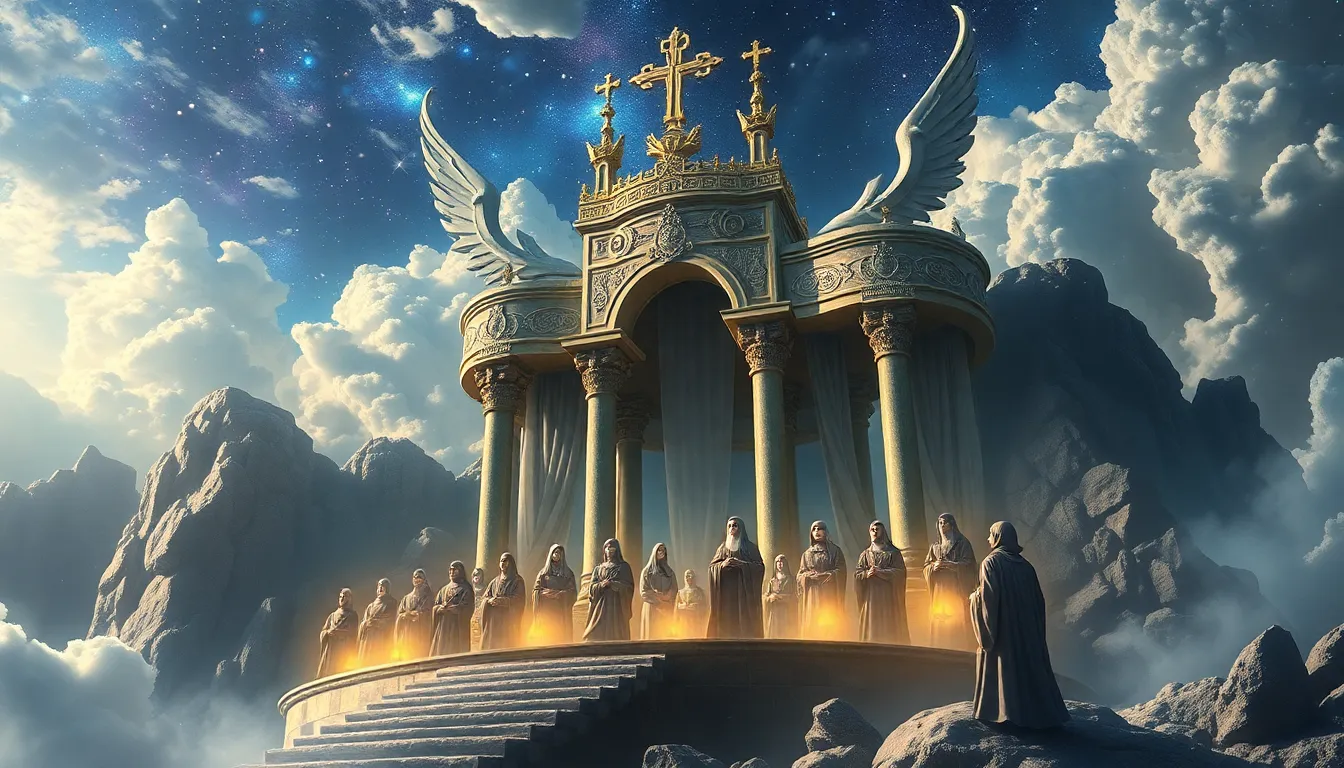The Kingdom of the Celestial Choir: Myths of Music and Harmony
I. Introduction to the Celestial Choir
The concept of a celestial choir resonates across various cultures, often embodying the divine expression of music and harmony. A celestial choir, in this context, refers to an assembly of divine beings or spirits that harmonize through music, influencing the world and human emotions. The significance of this idea transcends mere entertainment; it represents a deep connection between the cosmos and human experience.
Throughout history, myths and legends have celebrated the power of music, portraying it as a universal language that transcends barriers and connects the spiritual with the earthly. This article aims to explore the rich tapestry of myths surrounding music and harmony, examining their origins, cultural significance, and lasting impact on humanity.
II. Historical Context of Music in Mythology
Music has played a pivotal role in the development of ancient civilizations, serving as a means of communication, religious expression, and cultural identity. In civilizations such as Greece, Egypt, and Mesopotamia, music was often intertwined with the divine.
- Ancient Greece: Music was integral to their religious practices, with the Muses, goddesses of inspiration, representing various arts, including music.
- Ancient Egypt: Music was believed to please the gods and was used in rituals and ceremonies.
- Mesopotamia: Music was often associated with the worship of gods, with instruments like the lyre playing a central role in their culture.
Moreover, sacred music often served as a bridge between the divine and humanity, showcasing the evolution of musical myths through different eras and their ongoing relevance in cultural narratives.
III. The Mythical Origins of Music
Many cultures have creation myths that emphasize the role of music in the genesis of the world. These narratives often depict music as a primordial force that brings order and harmony out of chaos.
- Creation Myths: In several traditions, it is said that the universe was sung into existence, with sound waves creating the fabric of reality.
- Iconic Figures: Figures like Orpheus, who traveled to the underworld with his music, and Hermes, the messenger god known for his lyre, highlight the deep connection between music and mythology.
The symbolism of music in these creation narratives often emphasizes the power of sound to evoke emotions, shape destinies, and establish connections between the divine and the mortal realms.
IV. The Celestial Choir in Various Cultures
Different cultures have their interpretations of the celestial choir, reflecting unique beliefs about the relationship between music and the cosmos.
- Greek Muses: The nine Muses inspired artists and musicians, embodying the concept of divine creativity.
- Indigenous Beliefs: Many indigenous cultures view music as a language of nature, with spirits of the land communicating through sound.
- Eastern Philosophies: In traditions like Hinduism and Buddhism, music is seen as a means of achieving inner peace and harmony, resonating with the cosmic order.
These diverse perspectives on the celestial choir highlight a shared recognition of music’s spiritual significance and its ability to connect individuals with something greater than themselves.
V. The Power of Music in Mythical Narratives
In many myths, music serves as a transformative force, capable of altering realities and influencing lives.
- Transformative Force: Music can evoke powerful emotions and inspire profound changes in character and circumstance.
- Tales of Healing: Myths often depict music as a healer, restoring balance and health to individuals and communities.
- Communication with the Divine: Music is frequently portrayed as a medium through which mortals can connect with the divine, expressing devotion and seeking guidance.
These narratives illustrate how music transcends mere entertainment, embodying a deeper significance tied to human experience and the quest for understanding.
VI. Iconic Myths of Harmony and Discord
Many myths explore the interplay between harmony and discord, illustrating the balance required for a harmonious existence.
- Myths of Balance: Stories often depict the struggle between harmony and chaos, emphasizing that both elements are essential for growth and understanding.
- Consequences of Discord: Myths frequently warn of the dangers of discord, highlighting the emotional and societal repercussions when harmony is disrupted.
- Lessons Learned: Musical myths teach valuable lessons about human relationships, cooperation, and the importance of maintaining harmony in both personal and communal spheres.
These stories serve as reminders of the delicate balance required to navigate life’s complexities.
VII. The Influence of Music on Human Emotions and Society
The psychological effects of music have been recognized since ancient times, influencing both individual emotions and societal structures.
- Psychological Effects: Music can evoke a wide range of emotions, from joy to sorrow, affecting mood and mental health.
- Social Unifier: Music serves as a powerful tool for social cohesion, bringing people together during rituals and celebrations.
- Cultural Identity: Music is a vital aspect of storytelling, preserving cultural identity and history through generations.
These elements underscore the integral role of music in shaping human experience and fostering community bonds.
VIII. The Modern Interpretation of Celestial Music
In contemporary society, the themes of celestial music and mythology continue to resonate with artists and audiences alike.
- Contemporary Artists: Many modern musicians draw inspiration from mythological themes, exploring the intersection of music and spirituality.
- Resurgence of Ancient Practices: There is growing interest in ancient musical practices, with a focus on their healing and transformative qualities.
- Impact of Technology: Advances in technology have transformed music production and distribution, allowing for a global exploration of musical myths.
This modern interpretation keeps the legacy of the celestial choir alive, ensuring that the influence of music and harmony continues to thrive.
IX. Bridging Myth and Reality: The Future of Music and Harmony
As society moves forward, there are valuable lessons to be learned from musical myths that can guide future generations.
- Learning from Myths: Modern society can benefit from the wisdom embedded in musical myths, fostering understanding and empathy.
- Fostering Global Harmony: Music has the potential to bridge cultural divides, promoting peace and unity among diverse populations.
- Future Predictions: The evolution of music will likely continue to reflect cultural narratives, adapting to new realities while preserving core themes of harmony and connection.
This exploration of the future highlights the ongoing relevance of music as a means of fostering understanding and unity in an increasingly complex world.
X. Conclusion: The Timeless Legacy of the Celestial Choir
In conclusion, the myths of the celestial choir serve as a testament to the enduring power of music and harmony across cultures and epochs. From ancient civilizations to modern interpretations, the themes of transformation, healing, and connection remain central to human experience. As we continue to navigate the complexities of life, the legacy of the celestial choir reminds us of the profound impact music can have on our emotions, relationships, and society. Embracing this legacy can inspire future generations to seek harmony and understanding in a world that often seems divided.



